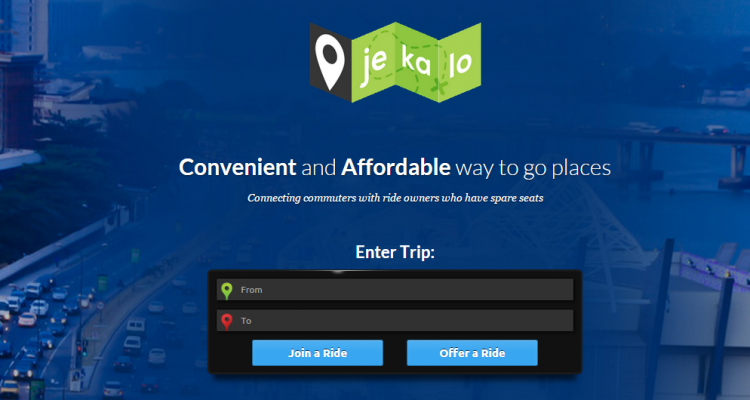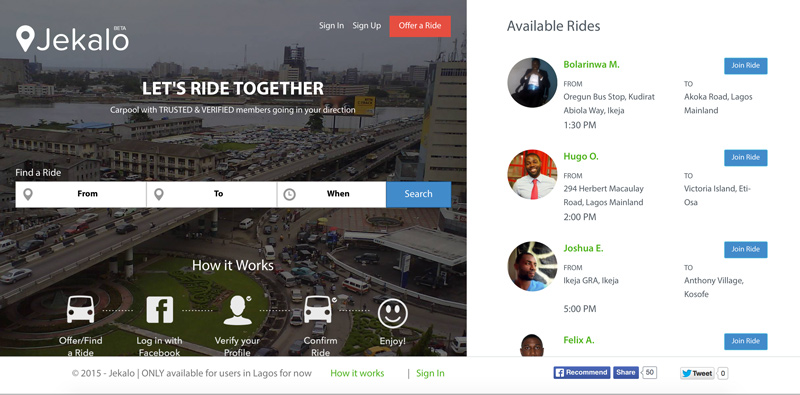First, let me tell you a story.
The year is 2012
January.
President Goodluck Jonathan in his genius has decided to abruptly remove the petrol subsidy. In the aftermath of nationwide protests, getting from place to place has not only become more of a struggle, but also costs nearly twice as much.
It’s my NYSC service year and I work in Victoria Island. Shortly after the January strikes, I am standing at the bus stop, contemplating the circuitous and now expensive commute back to the mainland where I live. The commercial buses are in hiding. Everyone is still trying to adjust to the fact that Petrol now costs N94 a litre.
As I stand there, a private vehicle, one of these “space buses” passes by, and the fellow riding shotgun is shouting “Costain, Costain!”.
Under normal circumstances, it would never occur to me to get into a private vehicle with people I don’t know, so I mentally dismiss it – until it happens again less than less than 30 seconds later; another private vehicle calling another destination.
This is weird?
The third time around, it is a Toyota Camry. It’s going my way. The person riding shotgun, calling “Yaba!” is female. I make my decision in a split second, wave them down and jump in. It takes five seconds to calm down and feel like I’m not getting kidnapped. By now I have figured out what’s going on.
In a bid to “subsidise” the newly hiked fuel costs, many Lagos car owners are actively looking for fares to pickup and dropoff, for a fee. The ensuing fuel scarcity has made public transport scarce, so it makes sense. The trouble is these makeshift transactions have issues, safety being the number one concern for the passengers and drivers! For the passenger, it is weird, expensive and a great way to get kidnapped. For the driver, it is awkward and inconvenient to pick up strangers and try to make change. Ordinarily most people won’t consider adding this stress to their lives, but these are not ordinary times.
“Do you work around here?”, the driver asks.
“Yeah,” I reply.
“And you live in Yaba?”
“Yes”
“Do you want me to drive you to where I picked you up and back to Yaba everyday, and you pay me N400 per day?”
“Yes, indeed, great!”
We did that for close to a year. I think that’s how I was able to endure that stressful daily commute for as long as did.
In my case, meeting this guy was serendipitous. Trust issues aside, it’s not everyday that you get to meet someone whose daily route is consistent enough with yours to make going to and from work with them a practicable option. But when I thought about it, I realised that there are certainly drivers and pedestrians who go the same way all the time, you just need to create some means by which they can find each other. I went online and sure enough, someone had already done it. Zimride (before they evolved into the Lyft model) was using technology and social media to reliably generate the serendipity I had just experienced, and at scale.
End of story.
***
Back then, I wanted…no I NEEDED a Zimride-type of service here in Nigeria too. When I considered moving from Yaba, it occurred to me that I might be too far away from my driver for our arrangement to continue to be mutually convenient, and that the odds that I would get lucky again were slim. I was sure that there are many people who live in Yaba that wish someone would drive them to work for a reasonable fee. Just a bit more than they would pay for annoying public transport, but less than it would cost to hire an actual cab. Just like I was certain that there are people who wouldn’t mind making some extra cash selling their empty seats to and from work, without the undignified hassle of looking like a hustler.
@zLm4 if someone doesn't do a ridesharing service, I'll have to do it. It's a no-brainer. The suits and BBs in these Danfos would jump at it
— Bankole Oluwafemi (@MrBankole) January 17, 2013
If I had not started blogging about tech full time at around the same time, I might have run with this idea. I would rant about it online and offline to anyone who would listen. Since that time, I’ve seen a number of people float what looks like the idea past me, but I’ve always taken one look and known that they didn’t get it.
Nearly three years later, I think I have finally found someone who does. Enter Jekalo.
Let’s ride together
Jekalo is a Yoruba word which translates literally to “let us go”. Or in this case, let’s ride together.
“As a frequent road user, mostly driving, I see a lot of people at bus stops and many times, I feel inclined to give them a lift. In the past, I have actually offered to share my ride with some of these people, helping them out on my way to work”, says Motoni Bolarinwa, Jekalo’s creator.
While driving different people Motoni found that there are different reasons why people would share a ride with someone. Having a ride buddy, convenience, better, faster, less humid, non-smelly commutes, and value for money all became obvious motivators. But of course, no one had created a platform that could make all of these possible. “So, why don’t I create it?”, Motoni thought to himself.
Motoni began to talk with potential users. Usually people who had shared rides with complete strangers. Building on their feedback and advice, he put together an Android app. In the course of developing his platform, he would draw inspiration from working versions of the product in other markets like Zimride and BlaBlaCar. Then in December 2014, Motoni took his idea to the Co-Creation Hub.
“I submitted an application in response to CcHub’s “Call For Ideas” programme and went through the selection process. Before CcHub, I simply had an idea and was working on an android app”.
The first iteration came out in March, 2015. I don’t know what happened at the CcHub’s Dev Parapo usability testing session where Jekalo must have gotten its first contact with people outside the development team, but frankly speaking, it looked like crap at the time. At least the landing page did, and I would never have signed up.
But after seeing the the current version of Jekalo that launched to the public last week, I’m certain that the feedback he received played a huge part in determining what the current version of the platform looks like. This time I signed up because it looked better and inspired not just trust, but also action with a logical and intuitive user interface. Since getting accepted into the CcHub’s pre-incubation programme, Motoni had definitely had help. And not just in the UI/UX department.
“As with other ideas in our program, our role is quite extensive and involves direct support from our product development, UX, distribution and monetization teams.”, said Tunji Eleso, director of pre-incubation at the CcHub.
“The teams worked with Jekalo to build a minimum viable product focusing on the design, user experience, security, content. Work also went into refining the idea and its revenue model with direct support from our management team”.
The Co-Creation Hub’s pre-incubation programme, not to be mistaken with its actual incubator, is essentially a pipeline of “interesting and relevant” ideas that the Hub invests $5,000 in, to see if its creator can build a minimum viable product and acquire users. If the beta, promotion and user-acquisition stages go well and the idea shows promise, the CcHub will move it into the proper incubation programme and invest up to $25,000 for seven percent equity.
Today’s Jekalo works a lot like I envisioned a carpooling app in Lagos would. You can see people going somewhere (available rides), and choose to join them. Both drivers and passengers link their social profiles (Facebook and LinkedIn), which provides social proof, and reassures all parties that everyone is a human with verifiable networks, which reduces (though doesn’t eliminate) the possibility that they are a crazy pyscho-killer or other harmful criminal. Payments will be handled seamlessly by the platform — no awkward forking over of cash after every trip. And the way I imagine it, if someone finds a driver/passenger/route that is consistent, they could just make it a regular thing! Yes, the risk of people cutting out the platform and forming private arrangements exists, but the stress of doing that is so much that the risk of disintermediation is really not that significant.
Gabriel is leaving Sangotedo to Victoria Island, Eti-Osa at 5:00 AM tomorrow, join him here http://t.co/k983Bnv4yO
— Jekalo (@jekaloHQ) June 1, 2015
Jekalo is by no means perfect, nor assured of success. But of all the ridesharing wannabes I’ve seen over the years, it definitely has the best shot at nailing this. It will all come down to the execution, which is determined by many variables; the entrepreneur, their team, and the kind of support networks plus funding available to them. Although, Motoni doesn’t particularly seem to be in fundraising mode at the moment.
“At the moment, I believe it is important to focus on ensuring the platform works and that it meets users’ expectations and transportation needs, which are convenience, affordability, and security”.
You know, you could use #jekalo to meet really interesting people.. no weirdos ofcourse -__- just cool people going your way. #RideSharing
— Jekalo (@jekaloHQ) June 1, 2015
He really gets it.
Thanks to Mo and Dami for reading through initial drafts.
We are discussing Jekalo on Radar.























